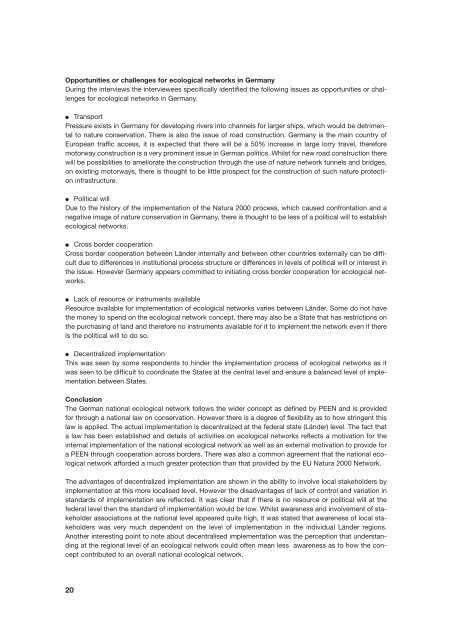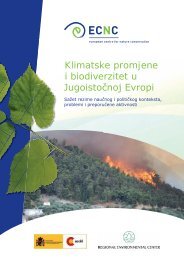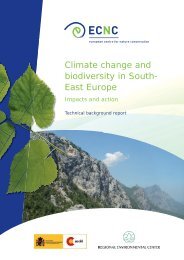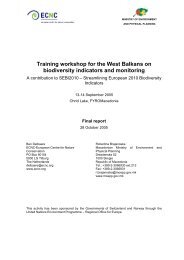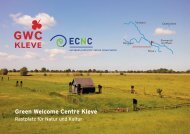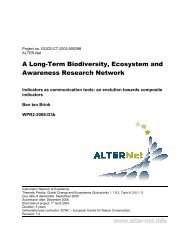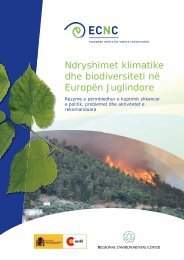2005 - Communicating the Pan-European Ecological Network - ECNC
2005 - Communicating the Pan-European Ecological Network - ECNC
2005 - Communicating the Pan-European Ecological Network - ECNC
You also want an ePaper? Increase the reach of your titles
YUMPU automatically turns print PDFs into web optimized ePapers that Google loves.
Opportunities or challenges for ecological networks in GermanyDuring <strong>the</strong> interviews <strong>the</strong> interviewees specifically identified <strong>the</strong> following issues as opportunities or challengesfor ecological networks in Germany.● TransportPressure exists in Germany for developing rivers into channels for larger ships, which would be detrimentalto nature conservation. There is also <strong>the</strong> issue of road construction. Germany is <strong>the</strong> main country of<strong>European</strong> traffic access, it is expected that <strong>the</strong>re will be a 50% increase in large lorry travel, <strong>the</strong>reforemotorway construction is a very prominent issue in German politics. Whilst for new road construction <strong>the</strong>rewill be possibilities to ameliorate <strong>the</strong> construction through <strong>the</strong> use of nature network tunnels and bridges,on existing motorways, <strong>the</strong>re is thought to be little prospect for <strong>the</strong> construction of such nature protectioninfrastructure.● Political willDue to <strong>the</strong> history of <strong>the</strong> implementation of <strong>the</strong> Natura 2000 process, which caused confrontation and anegative image of nature conservation in Germany, <strong>the</strong>re is thought to be less of a political will to establishecological networks.● Cross border cooperationCross border cooperation between Länder internally and between o<strong>the</strong>r countries externally can be difficultdue to differences in institutional process structure or differences in levels of political will or interest in<strong>the</strong> issue. However Germany appears committed to initiating cross border cooperation for ecological networks.● Lack of resource or instruments availableResource available for implementation of ecological networks varies between Länder. Some do not have<strong>the</strong> money to spend on <strong>the</strong> ecological network concept, <strong>the</strong>re may also be a State that has restrictions on<strong>the</strong> purchasing of land and <strong>the</strong>refore no instruments available for it to implement <strong>the</strong> network even if <strong>the</strong>reis <strong>the</strong> political will to do so.● Decentralized implementationThis was seen by some respondents to hinder <strong>the</strong> implementation process of ecological networks as itwas seen to be difficult to coordinate <strong>the</strong> States at <strong>the</strong> central level and ensure a balanced level of implementationbetween States.ConclusionThe German national ecological network follows <strong>the</strong> wider concept as defined by PEEN and is providedfor through a national law on conservation. However <strong>the</strong>re is a degree of flexibility as to how stringent thislaw is applied. The actual implementation is decentralized at <strong>the</strong> federal state (Länder) level. The fact thata law has been established and details of activities on ecological networks reflects a motivation for <strong>the</strong>internal implementation of <strong>the</strong> national ecological network as well as an external motivation to provide fora PEEN through cooperation across borders. There was also a common agreement that <strong>the</strong> national ecologicalnetwork afforded a much greater protection than that provided by <strong>the</strong> EU Natura 2000 <strong>Network</strong>.The advantages of decentralized implementation are shown in <strong>the</strong> ability to involve local stakeholders byimplementation at this more localised level. However <strong>the</strong> disadvantages of lack of control and variation instandards of implementation are reflected. It was clear that if <strong>the</strong>re is no resource or political will at <strong>the</strong>federal level <strong>the</strong>n <strong>the</strong> standard of implementation would be low. Whilst awareness and involvement of stakeholderassociations at <strong>the</strong> national level appeared quite high, it was stated that awareness of local stakeholderswas very much dependent on <strong>the</strong> level of implementation in <strong>the</strong> individual Länder regions.Ano<strong>the</strong>r interesting point to note about decentralised implementation was <strong>the</strong> perception that understandingat <strong>the</strong> regional level of an ecological network could often mean less awareness as to how <strong>the</strong> conceptcontributed to an overall national ecological network.20


